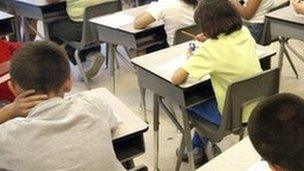Sats tests: More 11-year-olds meet standard
- Published

Results improved for English and Maths in tests taken by Year 6 pupils
The proportion of 11-year-olds in England reaching the expected level in reading and maths has gone up, official figures show.
Results from Sats tests taken by all 11-year-olds in England in May showed the percentage achieving level four or above in reading rose from 84% to 87%.
The Department for Education figures showed the number reaching the required level in maths rose from 80% to 84%.
More than 500,000 pupils took the tests.
Data from the past five years shows that pupils' maths scores have risen steadily since 2007 while reading scores have remained fairly stable.
The method of assessing pupils' writing skills changed in 2012 so the results are not comparable with previous years.
Writing gap
There was no externally marked test in writing and the subject's score was solely based on teacher assessment, which gave a figure of 81% reaching the expected level. The figure for writing in 2011, based on externally marked test results, was 75%.
A spokesman for the Department for Education said figures from a representative sample of pupils taking an externally marked writing test in 2012 showed 77% of pupils met the expected level.
The spokesman added: "This suggests that there would have been a gap between test and teacher assessment outcomes for all pupils at national level.
"Some difference between test and teacher assessment results can be expected as the outcomes are measured in different ways. A teacher assessment is the teacher's judgement of a pupil's performance across the curriculum and the academic year, whereas the tests assess a sample of the curriculum for specific pupils on the day of the tests.
"As no information on writing teacher assessment is available for previous years and the writing sample test results are not directly comparable to test arrangements in previous years, the evidence for a real increase in attainment in writing is less strong."
This year the combined reading and writing scores gave an overall English score of 85% of Year 6 pupils reaching the expected level.
The proportion of pupils achieving above the expected level also rose. The percentage gaining level five or above in reading rose from 43% to 48% and in maths from 35% to 39%.
Girls and boys did equally well in maths but girls continued to outperform boys in reading, with 90% of girls as opposed to 84% of boys achieving level four or above.
Minister for Education and Childcare Elizabeth Truss said: "I congratulate pupils, teachers and families on their hard work and achievements. The government is committed to driving up standards by giving teachers more freedom, strengthening discipline and improving teacher quality."
Christine Blower of the National Union of Teachers commented: "The improvements in pupils' reading and maths results are a credit to the hard work of teachers and pupils in Year 6 and throughout the primary sector.
"Pupils clearly have well-honed skills in reading for meaning and let us hope pleasure as well. Unfortunately, pupils lower down the primary system, being drilled for the Year One Phonics Screening Check, may be less proficient in these skills as they move through the school and the pressure to 'decode' text outweighs understanding.
"The increased scores in writing, through the use of teacher assessment this year, have proven that it is a more accurate and fair way of assessing pupils' ability. The NUT has long called for national curriculum tests at Key Stage 2 to be scrapped and replaced by teacher assessment which, when moderated well, is as robust an indicator of pupil achievement and progress as the current tests."
Head of the Nasuwt teaching union, Chris Keates, said: "These results also confirm that the claims of those who continue to be fixated with running down the state education system and decrying its successes are doing so entirely without foundation.
"It is important to put today's figures into context. For example, in mathematics only 49% of pupils in 1995 achieved Level 4 or above at the end of their primary education."
- Published23 May 2012
- Published15 December 2011
- Published14 December 2011
- Published3 November 2011
- Published2 August 2011
- Published2 August 2011